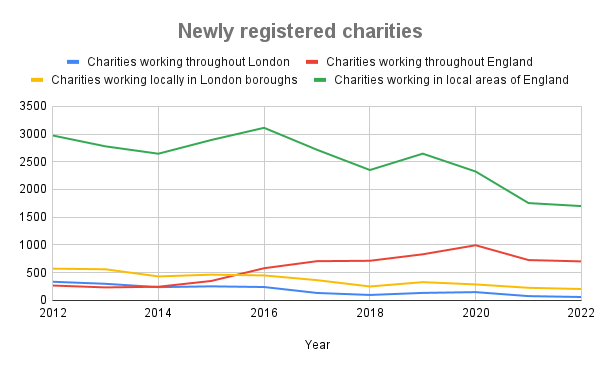The number of new charities working exclusively in local areas has steadily declined over the last 10 years while England-wide charity registrations have risen, according to Charity Commission data.
Civil Society News’ analysis of the regulator’s data shows new charities focused on working in the 119 local areas in England have fallen steadily in the last decade from 2,974 in 2012 to 1,701 in 2022.
During the same period, registrations of charities that work throughout England has risen steadily from 269 to 704 last year.
In 2012, there were more registrations for charities that worked throughout London, 337, than across England, but this has steeply declined since to 62 last year.
London-based charity groups said the decline “could be cause for concern” while NCVO said a lack of new charities opening could harm beneficiaries in local areas with few voluntary organisations.
A Charity Commission spokesperson said the data was “interesting” and that it would consider “whether it points to any trend that is relevant to our role as regulator”.
“In this context, it is important to note that our research also shows that local charities often instil a higher sense of public trust and play an important part in our society,” they added.

‘Tough challenges of starting up a charity’
As recently reported by Civil Society News, the lowest number of new charities registered with the Commission in 33 years in 2022, according to the regulator's database.
However, the overall decline was driven by a sharp drop since 2020, whereas the decline in new local charities is more sustained.
Meanwhile, the number of new charities that have registered as working nationally has risen.
Rosemary Macdonald, chief executive of UK Community Foundations, says the findings reflect tough times for charity survival.
“The recent decline in new registrations reflects the tough challenges of starting up a new charity or community group during this ongoing economic storm.”
Macdonald said the group’s members have reported “soaring levels of demand being seen by local charities similar to those at the height the pandemic, yet the same charities are struggling to maintain vital services, to keep staff, and many are worried about closing altogether”.
“Without the right financial intervention now, the closure of existing place-based charities – paralleled with a decline in new place-based charities being registered – will have a huge long-term impact on communities that depend on these essential doorstep services so much.”
Meanwhile, NCVO research manager Nayyara Tabassum said: “The impact of increasing charity closures and fewer new charities opening are likely to create worse outcomes for people living in areas which already have fewer charities and where their services are needed most.
“Although charity closures during the pandemic were lower than predicted, the number of newly-registered charities has fallen.
“We’re concerned about the impact that the ongoing cost-of-living crisis is having on charities in areas which are already in need of more services and have been hardest hit by the crisis.
“We’re calling for more targeted support for charities who are struggling.”
Number of new London-focused charities halves
In 2012, some 337 charities registered with the Commission as working throughout London, compared to just 62 last year.
And in the same period, the number of new charities working in specific London boroughs fell by over half from 573 in 2012 to 206 in 2022.
The biggest drop in registrations of London borough-focused charities came from 2013 to 2014, from 562 to 433.
Meanwhile, those registered as working in local areas of Wales has roughly stayed the same, with 182 in 2012, 144 in 2013 and 149 in 2022.
A decline in new groups at a local level “could be cause for concern” if it undermines funders’ desire to facilitate “a renewed and reenergised civil society that has the capacity and space to meet the challenges we face”, said Helen Mathie, director of partnerships and place at London Funders.
But at the same time, she said many funders are already worried about “meeting the needs of the groups they already support” as civil society is under increased pressure due to the cost-of-living crisis.
Meanwhile, City Bridge Trust chair Giles Shilson said grant applications from London-based charities had remained steady over the past decade.
“While the number of organisations in London might have fallen, demand for charitable services remains high and has risen higher still as a result of Covid and the cost-of-living crisis,” he said.
“In fact, although the number of applications we receive has remained stable over much of the past decade, 2022 saw a large increase in applications, and the amount of money asked for has also increased steadily over this time.”
Related articles












